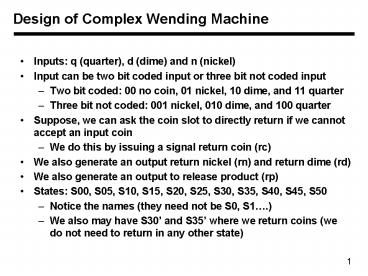Inputs: q (quarter), d (dime) and n (nickel) - PowerPoint PPT Presentation
Title:
Inputs: q (quarter), d (dime) and n (nickel)
Description:
Inputs: q (quarter), d (dime) and n (nickel) Input can be two bit coded input or three bit not coded input Two bit coded: 00 no coin, 01 nickel, 10 dime, and 11 quarter – PowerPoint PPT presentation
Number of Views:53
Avg rating:3.0/5.0
Title: Inputs: q (quarter), d (dime) and n (nickel)
1
Design of Complex Wending Machine
- Inputs q (quarter), d (dime) and n (nickel)
- Input can be two bit coded input or three bit not
coded input - Two bit coded 00 no coin, 01 nickel, 10 dime,
and 11 quarter - Three bit not coded 001 nickel, 010 dime, and
100 quarter - Suppose, we can ask the coin slot to directly
return if we cannot accept an input coin - We do this by issuing a signal return coin (rc)
- We also generate an output return nickel (rn) and
return dime (rd) - We also generate an output to release product
(rp) - States S00, S05, S10, S15, S20, S25, S30, S35,
S40, S45, S50 - Notice the names (they need not be S0, S1.)
- We also may have S30 and S35 where we return
coins (we do not need to return in any other
state)
2
State Changes in Wending Machine
Outputs (rc, rn, rd, rp) (0, 0, 0, 1) in
S40 Outputs (rc, rn, rd, rp) (0, 1, 0, 1) in
S45 Outputs (rc, rn, rd, rp) (0, 0, 1, 1) in S50
Outputs (rc, rn, rd, rp) (0, 0, 0, 0) in S00,
S05, S10, S15, S20, S25, S30, S35 Outputs (rc,
rn, rd, rp) (1, 0, 0, 0) in S30 and S35
3
Multiplexing and Multiplexer
- Multiplexers is a circuits which selects one of
many inputs - First let us assume that we have one bit inputs
- And we have eight inputs, I0, I1, I2, I3, I4, I5,
I6, I7 - We want one of them to be output based on
selection signal - We need a 3 bit select input to decide which
input goes to output - Note the order of select signals
- X is MSB and Z is LSB
4
Multiplexer Design
- We can write a logic equation for output F as
follows - F X Y Z I0 X Y Z I1 X Y Z I2 X Y
Z I3 - X Y Z I5 X Y Z I6 X Y Z I6 X
Y Z I7 - This circuit can be implemented using
- 8 four-input AND gates and one OR gates
5
Designing with multiplexers
- Multiplexers can be directly used to implement as
a circuit - Easiest way is to use function input as selection
signals - Input to multiplxer is a set of 1s and 0s
depending on the function to be implemented - We use a 8 to 1 multiplexer to implement function
F - Three select signals are X, Y, and Z, and output
is F - Eight inputs to multiplexer are 1 0 1 0 1 1
0 0 - Depending on the input signal
- multiplexer will select proper output
6
Using Multiplexers
- Suppose we want to design a rotate circuit
- Inputs are i3 i2 i1 i0
- Output is zero, one, two, or three bit rotated
output - Rotation can be in left or in right direction
- Four sets of outputs are
- i3 i2 i1 i0
- i2 i1 i0 i3
- i1 i0 i3 i2
- i0 i3 i2 i1
- Input/Output relations ship is given in the table
- We can implement this circuit using four 4 to 1
multiplexers































